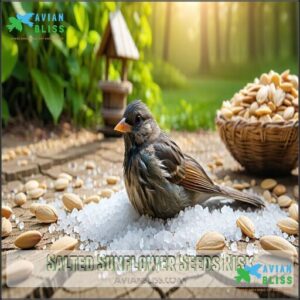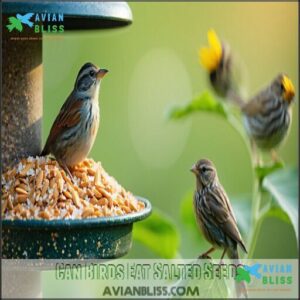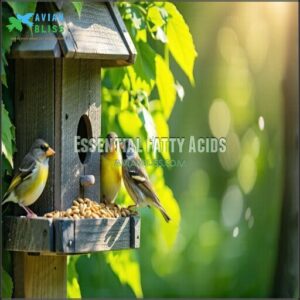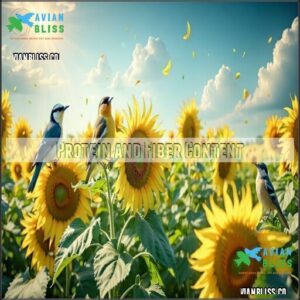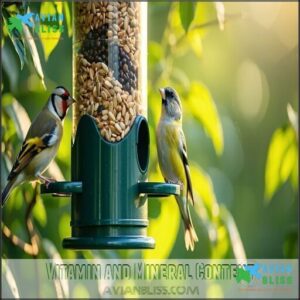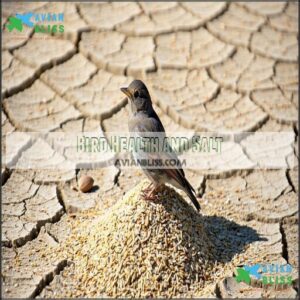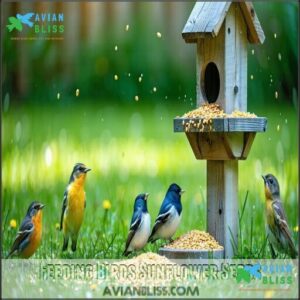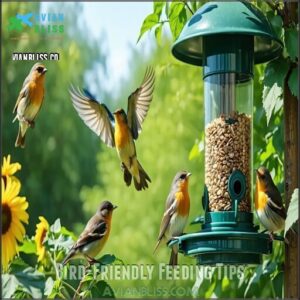This site is supported by our readers. We may earn a commission, at no cost to you, if you purchase through links.
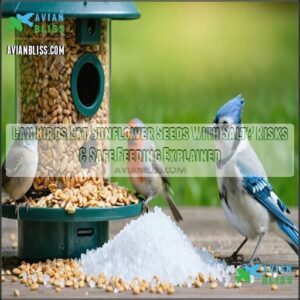
The salt content might seem harmless, but even small amounts can mess with their delicate systems.
High sodium causes dehydration, electrolyte imbalances, and kidney damage, which can be life-threatening for feathered friends.
Birds don’t have built-in mechanisms to handle processed salty foods, unlike humans scarfing down chips.
Unsalted sunflower seeds, however, are a nutritious treat.
They’re packed with healthy fats, protein, and essential vitamins, keeping birds happy and healthy.
So, skip the salted seeds and stick to plain ones—they’ll thank you with cheerful chirping.
Curious about safe seed feeding?
Stay tuned for tips on how to keep your birds happy and healthy with the right food choices, and remember that healthy fats are essential for their well-being.
Table Of Contents
- Key Takeaways
- Salted Sunflower Seeds Risk
- Can Birds Eat Salted Seeds
- Sunflower Seed Nutrition
- Bird Health and Salt
- Safe Sunflower Seed Options
- Feeding Birds Sunflower Seeds
- Bird-Friendly Feeding Tips
- Frequently Asked Questions (FAQs)
- Is it okay for birds to eat salt?
- Are salted sunflower seeds ok for squirrels?
- Can birds eat sunflower seeds?
- Can birds eat salty seeds?
- Can pigeons eat sunflower seeds?
- Are sunflower hearts good for birds?
- What birds eat sunflower chips?
- Are black oil sunflower seeds good for birds?
- Are salted sunflower seeds safe for birds?
- Can you wash the salt off sunflower seeds?
- Conclusion
Key Takeaways
- Don’t feed birds salted sunflower seeds—salt causes dehydration, kidney failure, and electrolyte imbalances.
- Always choose unsalted sunflower seeds; they’re safe, nutritious, and packed with healthy fats and essential nutrients.
- Washing salted seeds isn’t foolproof—residue can linger, so it’s best to stick to unsalted options.
- Birds can’t handle processed foods like salt, so natural, plain seeds keep them healthy and thriving.
Salted Sunflower Seeds Risk
Feeding birds salted sunflower seeds can harm their health, as even small amounts of sodium can lead to dehydration and kidney issues.
Birds can’t handle salt like humans, so it’s best to stick to unsalted options for their safety.
Sodium Content in Seeds
Salted sunflower seeds for birds? Not a good idea! Sodium content in seeds varies wildly.
Here’s what you should know:
- Salt toxicity damages birds’ mineral balance.
- Seed processing often adds harmful salt levels.
- Some brands pack over 2,800 mg of sodium per serving.
- Safe alternatives like unsalted seeds protect birds’ health.
Remember, is salt bad for birds? Absolutely! Safe seeds = happy birds.
Dehydration and Kidney Failure
Birds can’t handle salty seeds—too much sodium disrupts their kidneys, leading to dehydration and kidney failure.
Too much salt overwhelms birds’ tiny kidneys, causing dehydration, kidney failure, and even death—stick to unsalted seeds for their safety.
Salt toxicity is serious; even tiny amounts can be lethal. With disrupted electrolyte levels, birds can’t maintain proper water intake, stressing their delicate systems.
If you’re wondering, “Is salt bad for birds?”—the answer is yes. Avoid salted sunflower seeds; proper seed preparation saves lives!
Electrolyte Imbalance
When birds eat salted sunflower seeds, the extra salt disrupts their osmotic regulation, throwing off essential electrolyte balance.
This affects kidney function, leading to dehydration and muscle weakness. In severe cases, it triggers heart problems or even seizures.
Is salt bad for birds? Absolutely! The effects of salt on birds, even in small amounts, can pose serious health risks. Avoid salted seeds!
Can Birds Eat Salted Seeds
You might wonder, is salt bad for birds? The short answer is yes—salted sunflower seeds aren’t safe.
Even small amounts of sodium can harm birds, as their tiny bodies can’t handle excess salt. Salt toxicity can lead to serious hydration concerns and sodium buildup, causing kidney failure or even death.
Unlike humans, birds don’t sweat or drink much water, so they can’t flush out excess sodium effectively. Seed additives like salt or preservatives make things worse. Salted peanuts pose similar risks to birds’ health.
Here’s why salted seeds should stay off the feeder:
- Sodium content strains a bird’s electrolyte balance and hydration.
- Birds eat sunflower seeds without knowing salt dangers.
- Natural diets don’t include unnecessary salt.
Stick with safe alternatives like unsalted seeds to keep your feathered friends healthy and happy.
Sunflower Seed Nutrition
Sunflower seeds pack a nutritious punch for birds, offering essential fats, proteins, and fiber to fuel their energy needs.
They’re also rich in vitamins and minerals that support overall health, making them a valuable addition to any bird-friendly diet.
Essential Fatty Acids
When birds eat sunflower seeds, they benefit from essential fatty acids like linoleic acid, which supports healthy brain function and shiny feathers.
The omega balance in seed oils helps maintain their overall health, especially in challenging weather.
While salted sunflower seeds aren’t safe, unsalted seeds provide these benefits naturally, letting birds thrive without the hidden risks of sodium.
Protein and Fiber Content
A little protein goes a long way for birds, fueling their energy and aiding overall health.
Sunflower seeds pack a punch with essential protein and fiber, supporting feather growth and digestion.
It’s key for:
- Chick Development: Guarantees sturdy bones and healthy growth.
- Fiber Digestion: Keeps their systems running smoothly.
- Energy Source: Perfect for active, flying lifestyles.
Some birds prefer safflower seeds over sunflower seeds.
Vitamin and Mineral Content
In the context of bird nutrition, sunflower seeds shine with their rich seed mineral density and vitamin benefits.
They are packed with essential nutrients like potassium, calcium, and magnesium, which support bone health and energy.
Vitamins like E and B provide a nutritional variety that’s great year-round, making them a superfood snack for birds.
| Nutrient | Benefit |
|---|---|
| Vitamin E | Boosts immunity |
| Vitamin B Complex | Supports metabolism |
| Calcium | Strengthens bones |
| Magnesium | Aids energy production |
Bird Health and Salt
Regarding birds and salt, their bodies aren’t equipped to handle even small amounts of sodium.
Too much salt can lead to dehydration, kidney issues, and serious electrolyte imbalances that affect their overall health.
Salt Overload Symptoms
Salt overload in birds can cause lethargy, disorientation, and even seizures.
Plumage changes, like dull or ruffled feathers, signal stress from sodium toxicity.
Consuming salted sunflower seeds, birds risk dehydration and severe organ failure, as salt disrupts hydration and electrolyte balance.
Are salted seeds safe? Not at all! Protect bird health by offering unsalted sunflower seeds instead, to prevent severe organ failure.
Long-Term Effects of Salt Consumption
Salted sunflower seeds aren’t safe for birds in the long run. Even small amounts of sodium can cause organ damage, reduced lifespan, and breeding problems.
Salted sunflower seeds can harm birds, causing organ damage, dehydration, and reduced lifespan—choose unsalted seeds to keep them healthy and thriving!
Over time, sodium toxicity may lead to kidney issues and strange behavior. Watch for feather health changes, too.
While excessive salt is harmful, sodium chloride is actually essential for nerve and muscle function.
- Risks include:
- Organ damage
- Reduced breeding success
- Sodium-linked kidney stress
- Feather quality decline
- Behavioral shifts
Hydration and Electrolyte Balance
Birds rely on proper hydration and electrolytes to support kidney function and overall health.
Their tiny bodies can’t handle excess sodium, impacting water intake and bird kidney health.
Providing fresh water and unsalted seeds guarantees a balanced diet, promoting hydration and offering natural electrolyte sources birds need to thrive, preventing salt poisoning.
Safe Sunflower Seed Options
When choosing sunflower seeds for birds, always stick to unsalted seeds. While salted sunflower seeds might seem harmless, they can harm birds due to high sodium content.
Look for hulled seeds, which are easier to eat and reduce waste. Organic options are ideal if you’re avoiding chemicals or additives.
Seed size also matters—smaller birds prefer black oil sunflower seeds, while larger ones might enjoy striped varieties.
Sprouted seeds can be a nutritious treat, but make certain they’re fresh. Store your seeds in a cool, dry place to maintain freshness and prevent mold, which poses another risk to birds.
Providing safe bird food guarantees feathered visitors thrive. Remember, birds eat sunflower seeds happily, but keep the seeds natural and unsalted for their health.
Feeding Birds Sunflower Seeds
You can safely feed birds sunflower seeds, but it’s important to choose the right type and method.
Using clean feeders, offering unsalted seeds, and keeping feeding areas secure can help attract a wide variety of healthy birds to your yard.
Hanging Feeders and Bird Tables
Hanging feeders and bird tables are great for offering sunflower seeds to your feathered friends.
To guarantee success:
- Feeder Placement: Keep them near bushes for safety.
- Material Choices: Use durable metal or weatherproof plastic.
- Weather Protection: Add covers to shield seeds.
- Accessibility Design: Select wide openings for easy access.
- Maintenance Tips: Clean regularly to avoid mold.
Ground Feeders and Seed Trays
Ground feeders and seed trays are great for birds that prefer to eat on flat surfaces, like blackbirds and robins.
Place trays in sheltered spots to avoid weather damage and limit seed spillage.
Clean them regularly to prevent bacteria buildup, and watch out for ground predators.
Avoid using salted sunflower seeds—birds need safe, natural options for healthy feeding.
Squirrel-Proofing and Cleaning Feeders
Keeping feeders clean and squirrel-free boosts bird health.
Use squirrel baffles for pest control and place feeders away from jumpable surfaces.
Choose durable feeder material for longevity. Clean feeders often with mild cleaning solutions to prevent mold, a key bird feeding precaution.
Proper feeder cleanliness guarantees no harmful buildup. Skip salted sunflower seeds—birds eat sunflower seeds safely only when unsalted.
Bird-Friendly Feeding Tips
You can make your backyard a paradise for birds by offering them safe, nutritious foods and clean water.
Avoid giving them salted or roasted sunflower seeds, as these can harm their health and hydration.
Providing Fresh Water
Water matters as much as food when birds eat sunflower seeds.
Keep waterers clean to prevent algae and disease.
Make certain the water depth suits small birds—about an inch works well.
In winter, check for ice to keep water accessible.
- Use shallow bowls.
- Clean weekly.
- Position near feeders.
- Make certain safety from predators.
- Replace often.
Offering Variety of Seeds
When birds eat sunflower seeds, offering a variety guarantees you attract more feathered friends.
Seed mixes with regional blends cater to specific preferences, while alternative seeds like safflower or millet add diversity.
Birds enjoy exploring new tastes, so mix it up! Just skip salted sunflower seeds—birds don’t need the salt.
A diverse bird feeding station means endless entertainment! To attract finches, consider offering Nyjer or thistle seeds with regional blends and alternative seeds.
Avoiding Salted and Roasted Seeds
Salted sunflower seeds aren’t bird-friendly; the salt can cause toxicity, dehydration, and even kidney failure.
Stick to safe alternatives like unsalted seeds to prevent harm. Roasting dangers also exist, as roasted seeds may contain salt or preservatives.
Remember these tips:
- Select seeds labeled “unsalted.”
- Avoid roasted seeds.
- Embrace a natural diet for bird feeding.
- Check for toxic foods carefully.
Frequently Asked Questions (FAQs)
Is it okay for birds to eat salt?
Salt might seem harmless, but it’s a sneaky villain for birds.
Even tiny amounts can disrupt their hydration, mess with electrolytes, or cause kidney failure.
Stick to unsalted seeds to keep feathered friends healthy and happy.
Are salted sunflower seeds ok for squirrels?
Squirrels can eat salted sunflower seeds, but the salt isn’t healthy for them.
Excess sodium can lead to dehydration and long-term health problems.
Stick to unsalted seeds to keep their diet natural and safe.
Can birds eat sunflower seeds?
Yes, birds can eat sunflower seeds, but stick to unsalted ones.
Salt and preservatives in roasted seeds can harm them, causing dehydration or worse.
Offer natural seed varieties to keep your feathered friends healthy and happy!
Can birds eat salty seeds?
Feeding birds salty seeds isn’t a good idea.
Salt can harm birds, causing dehydration and even kidney failure.
Instead, stick with unsalted seeds to keep your feathered friends safe and healthy year-round.
Can pigeons eat sunflower seeds?
Did you know pigeons can eat sunflower seeds, but they prefer unsalted ones?
Salt can harm them, so stick to raw, unsalted seeds.
Offer sunflower hearts or black oil seeds—they’re easier for pigeons to enjoy!
Are sunflower hearts good for birds?
Sunflower hearts are fantastic for birds! They’re easy to eat, packed with nutrients, and mess-free since there’s no shell.
Smaller birds and softbills love them, making sunflower hearts a great choice for your feathered friends, as they are mess-free.
What birds eat sunflower chips?
Opposites attract, but in the case of sunflower chips, it’s all about accessibility.
Birds like finches, sparrows, and chickadees love them because there’s no hard shell to crack—just pure, easy-to-eat nutrition for small beaks.
Are black oil sunflower seeds good for birds?
Black oil sunflower seeds are excellent for birds.
They’re packed with energy, thanks to their high fat and oil content, and their thin shells make them an easy snack for small birds to enjoy.
Are salted sunflower seeds safe for birds?
Imagine giving candy to a bird—it seems harmless, but the salt in roasted sunflower seeds is like hidden trouble.
Birds’ kidneys can’t handle it, leading to dehydration or worse.
Stick to unsalted seeds instead.
Can you wash the salt off sunflower seeds?
Yes, you can rinse salted sunflower seeds under cold water and dry them thoroughly, but it’s risky.
Salt residue can linger, harming birds.
It’s safer to buy unsalted seeds to guarantee their health.
Conclusion
Just like a fish out of water, birds can’t handle salted sunflower seeds.
The high sodium content disrupts their delicate systems, leading to dehydration, electrolyte imbalances, and even kidney damage.
Instead, opt for plain, unsalted sunflower seeds, which are a safe and nutritious treat packed with healthy fats, protein, and essential nutrients.
Always remember, their tiny bodies aren’t built for processed foods, so stick to natural options, and your feathered friends will thrive, rewarding you with joyful chirps and vibrant energy.
- https://feederwatch.org/learn/feeding-birds/
- http://www.africangreys.com/articles/nutrition/sunflower.htm
- http://www.birdsandmore.com/diet.html
- https://www.rspb.org.uk/get-involved/activities/nature-on-your-doorstep/garden-activities/growtastyfoodforbirds2/
- https://www.gardeningknowhow.com/garden-how-to/info/allelopathic-plants.htm

